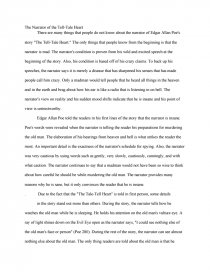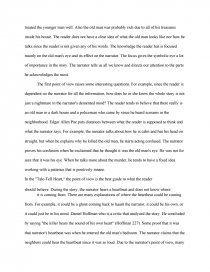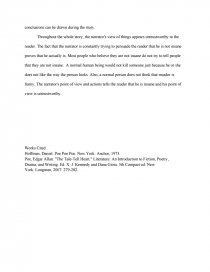The Narrator of the Tell-Tale Heart
Essay by review • June 12, 2011 • Essay • 1,076 Words (5 Pages) • 1,971 Views
The Narrator of the Tell-Tale Heart
There are many things that people do not know about the narrator of Edgar Allan Poe's story "The Tell-Tale Heart." The only things that people know from the beginning is that the narrator is mad. The narrator's condition is proven from his wild and excited speech at the beginning of the story. Also, his condition is based off of his crazy claims. To back up his speeches, the narrator says it is merely a disease that has sharpened his senses that has made people call him crazy. Only a madman would tell people that he heard all things in the heaven and in the earth and brag about how his ear is like a radio that is listening in on hell. The narrator's view on reality and his sudden mood shifts indicate that he is insane and his point of view is untrustworthy.
Edgar Allan Poe told the readers in his first lines of the story that the narrator is insane. Poe's words were revealed when the narrator is telling the reader his preparations for murdering the old man. The elaboration of his hearings from heaven and hell is what strikes the reader the most. An important detail is the exactness of the narrator's schedule for spying. Also, the narrator was very cautious by using words such as gently, very slowly, cautiously, cunningly, and with what caution. The narrator continues to say that a madman would not have been so wise to think about how careful he should be while murdering the old man. The narrator provides many reasons why he is sane, but it only convinces the reader that he is insane. . Due to the fact that the "The Tale-Tell Heart" is told in first person, some details
in the story stand out more than others. During the story, the narrator tells how he watches the old man while he is sleeping. He holds his attention on the old man's vulture eye. A ray of light shines down on the Evil Eye open as the narrator says, "I could see nothing else of the old man's face or person" (Poe 280). During the rest of the story, the narrator can see almost nothing else about the old man. The only thing readers are told about the old man is that he treated the younger man well. Also the old man was probably rich due to all of his treasures inside his house. The reader does not have a clear idea of what the old man looks like nor how he talks since the reader is not given any of his words. The knowledge the reader has is focused mainly on the old man's eye and its effect on the narrator. The focus gives the symbolic eye a lot of importance in the story. The narrator tells us all we know and directs our attention to the parts he acknowledges the most.
The first point of view raises some interesting questions. For example, since the reader is dependent on the narrator for all the information, how does he or she know the whole story is not just a nightmare in the narrator's demented mind? The reader tends to believe that there really is an old man in a dark house and a policeman who came by since he heard screams in the neighborhood. Edgar Allen Poe puts distances between what the reader is supposed to think and what the narrator says. For example, the narrator talks about how he is calm and has his head on straight, but when he explains why he killed the old man, he starts
...
...


